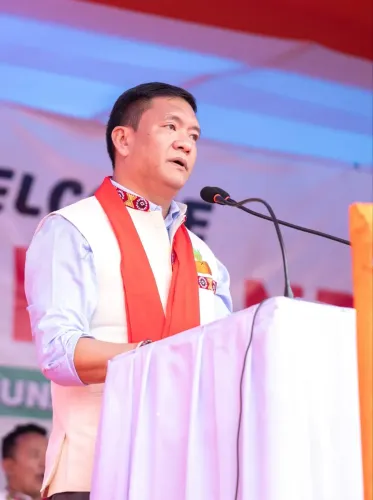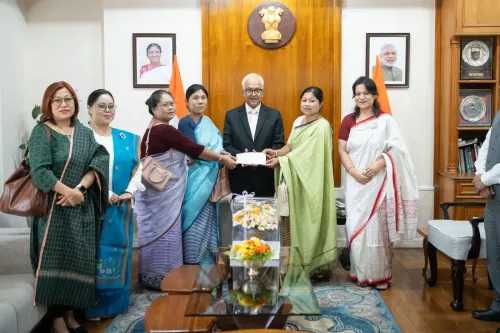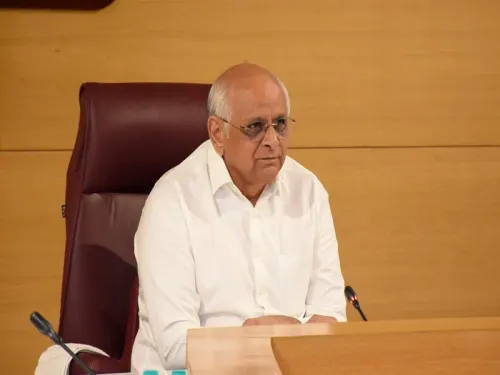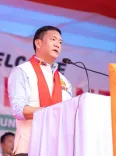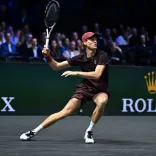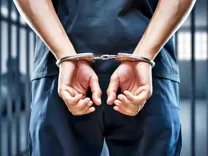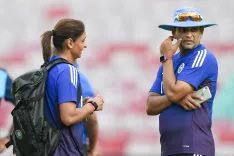What Landmark Verdicts Did CJI Sanjiv Khanna Deliver?
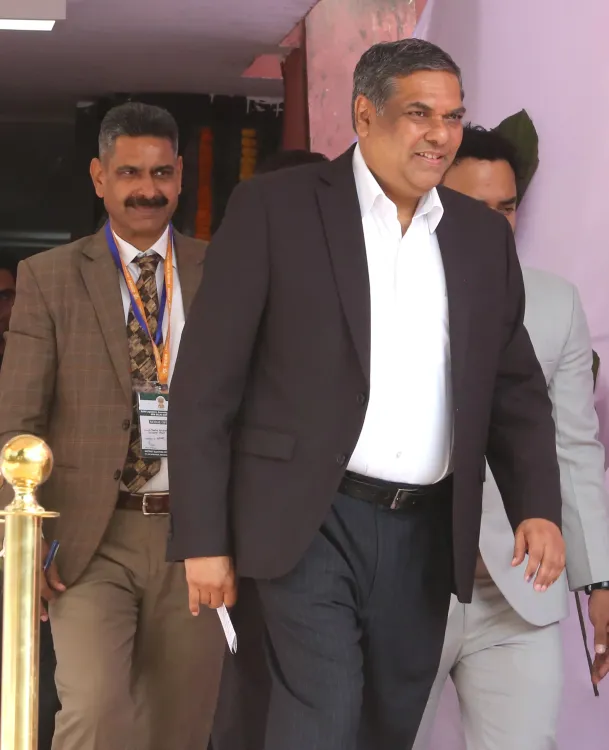
Synopsis
Key Takeaways
- Justice Khanna's tenure has been marked by landmark decisions.
- His rulings have addressed critical constitutional issues.
- He emphasized the importance of justice and equality.
- His retirement marks the end of a significant era in the judiciary.
- Justice Gavai will succeed him as the next CJI.
New Delhi, May 13 (NationPress) Chief Justice of India (CJI) Sanjiv Khanna is poised to retire from the highest judicial position in the nation on Tuesday, reaching the mandatory retirement age of 65 years.
He took his oath as the 51st CJI on November 11 of the previous year, serving a tenure of approximately six months.
Following Justice Khanna's retirement, Justice Gavai, currently the senior-most puisne judge of the Supreme Court, will assume office as the 52nd CJI.
Throughout his more than six years at the Supreme Court, Justice Khanna issued several landmark decisions.
He was involved in significant rulings concerning Article 370, the decriminalization of adultery, the electoral bonds scheme, and the EVM-VVPAT tally case, among others.
Before ascending to the Supreme Court, Justice Khanna functioned as a judge at the Delhi High Court until January 2019.
Born in May 1960, he earned his law degree from the Campus Law Centre at Delhi University. He enrolled as an advocate with the Bar Council of Delhi in 1983, focusing on taxation, arbitration, commercial law, environmental law, medical negligence law, and company law at the Delhi High Court.
Here are some pivotal decisions made by him as a Supreme Court judge.
Places of Worship Act: The CJI Khanna-led Special Bench issued an interim order on December 12, 2024, mandating that no new suits would be filed under the Places of Worship Act, and no final orders would be made in ongoing cases until further notice.
The Supreme Court was addressing numerous petitions questioning the validity of certain provisions of this controversial law, which restricts lawsuits to reclaim places of worship or modify their status as of August 15, 1947.
Waqf Act: During hearings on various petitions contesting the constitutionality of the Waqf (Amendment) Act, 2025, the CJI Khanna-led Bench suggested a stay order, prompting the Union government to commit not to de-notify provisions concerning 'waqf by user' or to include non-Muslim members on the Waqf Board.
Last week, CJI Khanna indicated that the Bench, which also included Justices Sanjay Kumar and K.V. Viswanathan, did not plan to reserve its judgment at the interim stage due to his upcoming retirement, directing the issue to be heard by the Justice B.R. Gavai-led Bench.
BJP MP Remarks on Judiciary: A CJI Khanna-led Bench chose not to entertain a Public Interest Litigation (PIL) seeking contempt of court against BJP Lok Sabha member Nishikant Dubey for his comments regarding the judiciary. However, the Bench remarked that such comments were extremely irresponsible and had the potential to undermine the authority of the Supreme Court and disrupt the administration of justice.
While hearings on the constitutionality of the Waqf (Amendment) Act, 2025, were underway, Dubey, a Member of Parliament from Godda in Jharkhand, stated in an interview that “Chief Justice of India Sanjiv Khanna is responsible for all the civil wars happening in India” and that “only the Supreme Court is to blame for provoking religious conflict in this country.”
In its ruling, the CJI Khanna-led Bench emphasized that any efforts to incite communal hatred or engage in hate speech must be confronted decisively.
“Hate speech is unacceptable as it diminishes the dignity and self-worth of targeted groups, fosters discord, and erodes the essential tolerance required in a multicultural society committed to equality,” the Supreme Court stated, adding that any attempts to alienate or humiliate a group are criminal offenses that must be addressed appropriately.
EVM-VVPAT Tally Verdict: A Bench led by Justice Khanna acknowledged the fundamental right of voters to ensure their votes are accurately recorded and counted, but clarified that this does not equate to a right to 100% counting of VVPAT slips or physical access to the VVPAT slips that voters should be allowed to drop in a box.
The Bench, which also included Justice Dipankar Datta, noted that providing physical access to VVPAT slips for voters is “problematic and impractical,” potentially leading to misuse, malpractice, and disputes.
The Supreme Court dismissed the suggestion to revert to a ballot paper system as “illogical and unsound,” highlighting the well-documented flaws of the ballot paper process.
Interim Bail to Arvind Kejriwal in ED Case: In a ruling made on July 12 of the previous year, a Bench led by Justice Khanna concluded that former Delhi Chief Minister Arvind Kejriwal could be granted interim bail due to the inviolable nature of the Right to Life and Liberty, especially after enduring over 90 days of incarceration.
The two-judge Bench, which also comprised Justice Datta, referred Kejriwal’s plea challenging his arrest and subsequent remand by the Enforcement Directorate (ED) in the liquor policy case to a larger Bench for authoritative guidance on the legal issues involved.
The Bench also encouraged Kejriwal to consider stepping down from his role as CM.
“We recognize that Arvind Kejriwal is an elected leader and the Chief Minister of Delhi, a position of great significance and influence. While we do not issue directives, we leave it to Arvind Kejriwal to decide,” it stated.
The two-judge Bench, which also included Justice Datta, emphasized, “The larger Bench, if deemed necessary, can frame questions and determine the conditions that the court may impose in such cases.”
Interim Bail to Kejriwal During Lok Sabha Elections: In light of the upcoming 2024 general elections, a Bench led by Justice Khanna granted Kejriwal a 21-day interim bail in the money laundering case, instructing him to surrender by June 2.
The Justice Khanna-led Bench imposed several conditions, including prohibiting Kejriwal from visiting his office or secretariat while on interim bail. It made clear that this interim relief should not be interpreted as a comment on the merits of the case or the pending appeal before the Supreme Court.
According to the Supreme Court order, Kejriwal was barred from signing official documents unless necessary for obtaining clearance or approval from the Lieutenant Governor.
The Bench, which also included Justice Datta, reiterated that it had issued a “very clear” order delineating the timeline for Kejriwal’s “release and surrender” and would not make exceptions for anyone.
Electoral Bonds Scheme: In a unanimous decision, the Constitution Bench led by CJI Chandrachud invalidated the electoral bonds scheme, asserting that withholding details of political party funding from voters creates a dichotomy and that the financing of political parties cannot be treated separately from that of candidates participating in elections.
In a separate concurring opinion, Justice Khanna stated that upon analyzing the data, he concluded that the electoral bonds scheme did not satisfy the proportionality test's balancing requirement.
“However, I must clarify that I have not strictly applied proportionality due to limited data and evidence,” he remarked.
His opinion included data available on the Election Commission (EC) website and submissions from the petitioners.
Justice Khanna also clarified that the court had not accessed the sealed envelope provided by the EC and noted that a significant portion of contributions via bonds had been directed to ruling political parties at both the central and state levels.
Article 370: A five-judge Constitution Bench, which included Justice Khanna, upheld the abrogation of Article 370. In a concurring opinion, Justice Khanna noted, “Article 370 was implemented as a transitional measure and lacked a permanent nature. The abrogation of Article 370 does not undermine the federal structure, as the citizens of Jammu and Kashmir will enjoy the same rights and status as those in other regions of the nation.”
The Constitution Bench, presided over by then-CJI Chandrachud, mandated the Election Commission to initiate steps for conducting elections in the Jammu and Kashmir Assembly by September 30, 2024, and stated that “restoration of statehood will occur at the earliest and as soon as feasible.”
It left open the question of whether Parliament can nullify the character of statehood by converting a state into one or more Union Territories, relying on Solicitor General Tushar Mehta’s assertion that statehood would be restored to Jammu and Kashmir.
In May 2024, the Supreme Court declined to review the Constitution Bench ruling and dismissed a series of review petitions challenging its decision.

